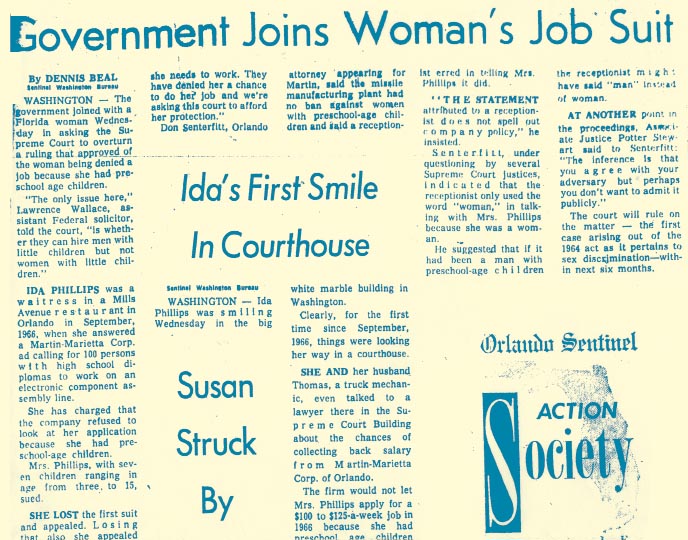Decisions Made Here Continue to Impact Our Lives
Composed of five counties from the center of the state to the Atlantic seaboard, the Orlando Division of the Middle District of Florida hears a diverse range of casespatent infringement, voting rights, contract disputes, suits against the government, libel, environmentalmatters, medicalmalpractice, employmentdisputes, bankruptcy, maritime, criminal cases, and many others.
Defending Civil Rights in the Workplace
In September 1966, Ida Phillips worked as a waitress earning $51 a week at an Orlando restaurant. She and her husband, Thomas, had seven children, ranging in age from three to 16 years old. The youngest was in preschool.
Ms. Phillips answered an ad calling for 100 persons with high school diplomas to work on an electronic component assembly line for missile manufacturer Martin-Marietta, now Lockheed Martin. The job paid $100–$125 a week, and hundreds of applicants showed up. But when she turned in her application, Ms. Phillips was told she would not be hired because she had preschool-age children, and statistics showed that those mothers have higher absentee rates.
Ida Phillips wrote a letter to the president of the United States, Lyndon B. Johnson, who had signed the 1964 Civil Rights Act. She complained that she had been denied the right to equal employment. Her letter was turned over to the National Association for the Advancement of Colored People (NAACP).
Men Jobs and Women Jobs
Represented by Reese Marshall, a lawyer from the NAACP Legal Defense Fund, Ms. Phillips, filed a lawsuit against Martin-Marietta. However, both the United States District Court in Orlando and the Fifth Circuit Court of Appeals in New Orleans decided against her. With only one judge dissenting, the courts determined that since the responsibilities of men and women are not the same, employers are entitled to “recognize these different responsibilities in establishing hiring policies.”
“You no longer have men jobs and women jobs,” Robinson told the Supreme Court
In 1970, lawyer James Robinson took the case to the United States Supreme Court, arguing that since the passing of the 1964 Civil Rights Act, “you no longer have men jobs and women jobs.” Robinson told the Supreme Court that women “should be treated as individuals… with the right to show their own merits” and that “4.2 million women would be out of work if all firms applied the same ban as Martin-Marietta did against mothers with small children.”
 Ida Phillips was one of the first cases I handled as an attorney. It was my ‘baptism by fire.’ This was a case involving a white woman who was denied employment by Martin-Marietta Steel Company because she had preschool age children. If this denial of employment were to be upheld, it would have meant that anyone in the protected categories—race, religion, sex, age or handicap—could be denied employment because of an employer’s decision based purely on a subjective factor. This would have meant an employer could impose additional subjective standards to deny employment to any person.
Ida Phillips was one of the first cases I handled as an attorney. It was my ‘baptism by fire.’ This was a case involving a white woman who was denied employment by Martin-Marietta Steel Company because she had preschool age children. If this denial of employment were to be upheld, it would have meant that anyone in the protected categories—race, religion, sex, age or handicap—could be denied employment because of an employer’s decision based purely on a subjective factor. This would have meant an employer could impose additional subjective standards to deny employment to any person.
Having grown up in Fort Lauderdale, Florida, the son of a mother who only finished the third grade but who managed to send her four children to college, I have been guided by my mother’s expectations of me. My mother had a vision for my legal career that I could help level the playing field by assisting persons who otherwise would be denied access to our judicial system. I have been fortunate to enjoy a career of helping others navigate the legal system.”
Instilled with a social conscience forged in the heated 1960s, Marshall still makes it his business today to provide legal services pro bono (voluntarily and free of charge) helping the underserved find solutions to their problems.
